Uganda Spine Mission 2012
It is that time of year again when Dr. Lieberman and his team travel to provide spine care for the citizens of Uganda. This year Dr. Lieberman’s team consists of the following members:
1) Izzy Lieberman (spine surgeon) Dallas
2) Brian Failla (equipment manager) Ft lauderdale
3) Paul Holman (spine surgeon) Houston
4) Krzysztof Kusza (anaesthesia) Poland
5) Zbigniew Szkulmowski (anaesthesia) Poland
6) Ejovi Ughwanogho (spine fellow) Dallas
7) Sherri LaCivita (scrub technician) Dallas
8) Elizabeth Wolhfarth (scrub technician) Ft lauderdale
9) Negozi Akotaobi (physical therapist) Dallas
10) Jason Ehrhardt (monitoring tech) Dallas
11) Rob Davis (equipment manager) Dallas
12) Rachelle Lieberman (teacher) Boulder, CO
13) Erin Sadler (medical student) Toronto
Today’s post was contributed by Erin Sadler. Enjoy!
Day 1 – Arrival to Entebbe, Kampala
The team all congregated at Heathrow Terminal 5 for a 9:15 pm departure to Entebbe International Airport. After some brief introductions the team seemed to quickly mesh well together and a warm dynamic was almost instantly evident. The team this year is quite large with thirteen members with various backgrounds, from the United States, Canada, and Poland. After boarding the plane many of us were exhausted from our travels that brought us to Heathrow, and thus tried our best to take advantage of the 8 hour overnight flight to Entebbe and get some sleep!
We landed in Entebbe at 745 hrs after a few hiccups from the flight deck in their attempt to land with heavy tail winds. We were all pleasantly surprised by the beautiful weather with temperatures in the mid 20s (68 degrees fahrenheit). We all gathered our gear, minus a lost bag from Poland, and made our way to meet our buses that would be responsible for our transportation for the next 2 weeks. We loaded up the buses quickly and began our journey to Kampala. Along the route there was much to be seen and taken in. The first glimpse of the fertile Ugandan landscape, the vibrant Ugandan people everywhere you look, the pop-up stalls along the road, and the many handmade bed frames for sale along the roadside, without any mattress stores in sight kept us all entertained throughout the journey.
We arrived at the Golf Course Apartments in Kampala where we will be staying for the next 2 weeks. These accommodations are very comfortable and well outfitted to suit our needs. Between the thirteen members of the team there are two apartments. Once we had moved our luggage in and had a chance to refresh ourselves and brush our teeth for the first time in too long, we were once again off into Kampala to do some shopping to buy food items for breakfasts and other necessities like water, hand sanitizer, and the odd bottle of wine! One hefty shopping bill later, and buses packed to the brim we headed back to the apartments to unload and organize ourselves before taking off again to go visit the two hospitals we will be working at.
The first hospital we visited was Case Hospital, which is a private hospital, relatively affluent with decent equipment, services and patient care; quite similar to a standard hospital in North America.
Izzy unpacking more surgical equipment.
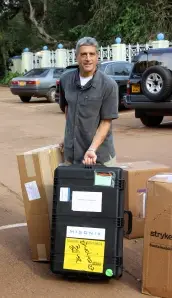
Conversely, we then went to Mulago Hospital, which is the national public hospital; located on a sprawling campus of single story bunker-like buildings that serve as different wards. We specifically visited the Spine Ward, where we will be performing operations in the theatre, and the Orthopedic Ward.
Some surgical equipment at Case.
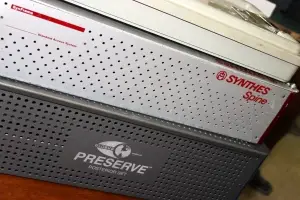
The spinal ward at Melago.
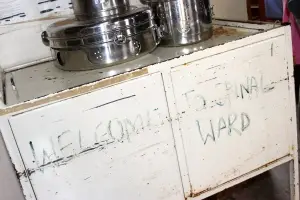
Supplies at the spinal ward in Melago.
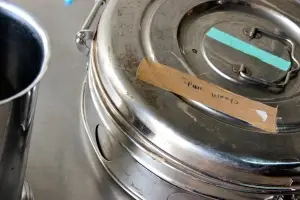
Both were equally eye-opening: wide open rooms with several beds lined up side by side, filled with patients, and more surprising, the patient beds were surrounded by families. It was very interesting to see the dynamic of patient care in the Mulago setting, where the families seem to be the primary care givers despite the inpatient nature of the hospital accommodations. The families were huddled around the patients, sometimes having created a small area near the patient`s bed where they have essentially set up a temporary squatting home, feeding them self-prepared food, bathing them, and really the only people in the hospital providing vigilant care to these patients. Futhermore, the familial presence extends beyond the hospital walls, where as you walk outside you notice families have found a space to call their own on the hospital property and are essentially squatting there as their loved one remains in hospital. As I toured these poorly faciliated wards, I couldn`t help but question how these native Ugandans view us: as foreigners who are coming to try and help, or perhaps do they question our role in their medical care? To continue this enlightening cultural experience, we then went to walk through a nearby slum in Kampala. As a group we walked through narrow dirt alleyways for streets, which were covered in garbarge and had waste water running down the middle, as beautiful friendly people waved and smiled at us through the hanging laundry, and curtained doorways fondly yelling “Muzungu” as we passed them by. This was unlike anything I have ever experienced before in my life, and not because I haven’t seen images like this on television or in other popular media outlets, but I think I was most taken by the joy and sense of community that I felt in this incredibly extreme and impoverished environment. I guess I expected to feel sadder and helplessness, which I definitely did feel, but these negative feelings were overwhelmed by my feeling that although these people live in the most horrific conditions, their sense of community is really quite powerful and uplifting. Moreover, the throngs of beautiful children with toothy grinned smiles from ear to ear was also quite a powerful sight, for there seemed to be such a sense of responsibility of the older children to look after the young, and the spirit of the child was so clearly evident, it outshone any despair that they, or more likely I, was feeling.
Boy from the slums.
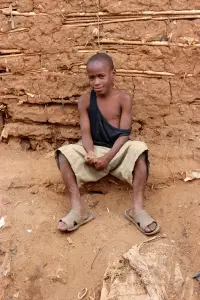
Ejovi playing soccer with some of the kids.

Picture of the slums.

As we got into our buses and drove 5 minutes down the road into our plush apartments it became very apparent how contrastingly different Ugandan life can be, just simply a few blocks apart. We couldn’t help but feel incredibly spoiled as we spent the rest of the afternoon cooling off by the pool, and then heading to an amazing Indian restaurant for a lively dinner and some delicious curries. Before everyone fell asleep at the table, we headed home to spend our first night in Kampala, and have sweet dreams of the upcoming days of hard, yet extremely meaningful work to come!
Our group at dinner.

Stay tuned for more updates!


